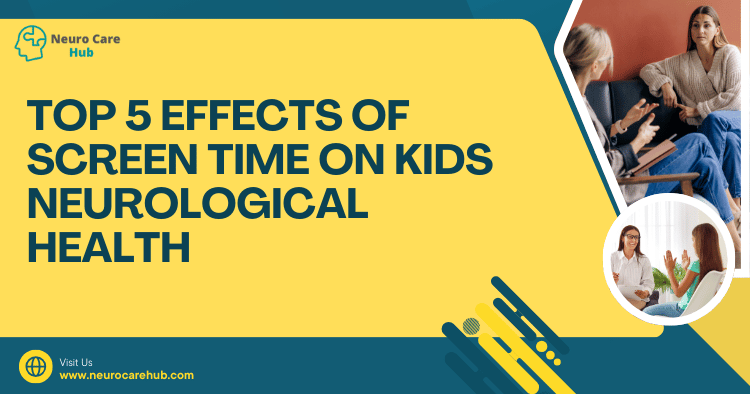Table of Contents
- Introduction
- 1. Cognitive Development
- 2. Attention Span
- 3. Social Skills
- 4. Sleep Patterns
- 5. Mental Health
- FAQs
- Conclusion
Introduction
As technology continues to evolve, screen time among children has surged, with reports indicating that kids now spend an average of 7 hours a day on screens. While screens can provide educational content and entertainment, excessive use has notable adverse effects on neurological development. Understanding these impacts is crucial for parents, educators, and caregivers. This article explores the top five effects of screen time on kids’ neurological health and offers insights into fostering a healthier digital environment.
Did You Know?
Studies suggest that the average child spends more time in front of screens than they do sleeping!
1. Cognitive Development
How Screen Time Impacts Learning
Children learn and develop cognitive skills through interaction with their environment. Studies have shown that excessive screen time can hinder cognitive development in various ways:
- Reduced Attention to Learning Activities: Kids engrossed in screens may show less interest in books and other educational materials. A report from the American Academy of Pediatrics (AAP) highlights that children who spend more than two hours a day on screens may struggle with attention and comprehension.
- Decreased Academic Performance: Research published in JAMA Pediatrics indicates that children who spend more time on screens tend to perform worse academically, often due to distractions and a lack of engagement in critical thinking activities.
- Impaired Problem-Solving Skills: Interactive play promotes problem-solving abilities. Excessive screen time can limit opportunities for hands-on learning experiences, which are critical for developing these skills.
Quote to Consider
“The mind is like a parachute. It doesn’t work if it isn’t open.” – Frank Zappa
Also look for insights on how to enhance cognitive development through balanced screen time and alternative activities in Top 5 Ways Caregivers Enhance Neuro Care Effectiveness.
Visual Element
| Cognitive Skills Affected | Evidence |
|---|---|
| Attention | AAP Research |
| Academic Performance | JAMA Pediatrics Study |
| Problem-Solving Skills | Developmental Psychology Studies |
2. Attention Span
The Connection Between Screens and Attention
The rise of fast-paced media has led to concerns about its influence on children’s attention spans. Here’s how screen time affects this vital aspect of neurological health:
- Shortened Attention Span: Studies show that children exposed to rapid scene changes in media may find it challenging to focus on slower-paced activities, like reading. The constant stimulation from screens can train the brain to expect immediate gratification, making it harder for kids to engage in prolonged tasks.
- Increased Distractibility: A study by the National Institutes of Health (NIH) found that increased screen time correlates with higher levels of distractibility in children, affecting their ability to concentrate on schoolwork and other essential tasks.
Insightful Note
Consider incorporating activities that require sustained attention, such as puzzles or board games, to counteract the effects of screen time.
3. Social Skills
The Role of Screen Interaction in Social Development
Social skills are essential for developing relationships and navigating the world. However, excessive screen time can impede this development:
- Reduced Face-to-Face Interactions: Children who spend significant time on screens may miss out on vital social cues learned through in-person interactions. This can lead to difficulties in communication and relationship-building.
- Increased Isolation: While online gaming and social media can create virtual connections, they often lack the depth of real-life relationships. The Harvard Health Blog emphasizes that in-person interactions are crucial for emotional and social development.
Important Reminder
Encouraging playdates and outdoor activities can help children develop essential social skills.
For more on the importance of interpersonal skills, refer to Top 5 Ways Family Support Enhances Neuro Recovery.
Visual Element
| Social Skills Affected | Impact |
|---|---|
| Communication Skills | Impaired |
| Emotional Intelligence | Reduced |
| Relationship Building | Limited |
4. Sleep Patterns
How Screens Affect Sleep Quality
Quality sleep is paramount for neurological development. Unfortunately, screen time can disrupt sleep patterns in several ways:
- Blue Light Exposure: The blue light emitted by screens can interfere with melatonin production, making it harder for children to fall asleep. A study in Sleep Medicine Reviews suggests that excessive screen use before bedtime can lead to sleep disturbances.
- Increased Sleep Latency: Children engaged in stimulating screen activities may experience increased sleep latency, meaning it takes longer for them to fall asleep. Lack of sleep can further exacerbate cognitive and emotional issues.
Sleep Tip
Create a calming bedtime routine that includes reading or other quiet activities to wind down before sleep.
Explore strategies for promoting better sleep hygiene in children in Top 5 Tips for Improving Sleep Hygiene.
FAQs
Q: What are some ways to reduce screen time before bed?
A: Encourage a “no screens” rule one hour before bedtime, create a bedtime routine that includes reading or quiet activities, and keep devices out of the bedroom.
5. Mental Health
The Link Between Screen Time and Emotional Well-Being
Mental health is a growing concern for children today, and screen time plays a significant role:
- Increased Anxiety and Depression: Research published in Cyberpsychology, Behavior, and Social Networking shows a correlation between heavy social media use and increased feelings of anxiety and depression among adolescents.
- Low Self-Esteem: Constant exposure to curated social media content can lead to unhealthy comparisons and a distorted self-image, particularly among young girls, as noted in studies from the Journal of Youth and Adolescence.
Encouraging Note
Open discussions about social media and its impact can help children develop a healthier relationship with technology.
For strategies to support mental health in children, check out Top 5 Ways to Support a Loved One with a Neurological Disorder.
Visual Element
| Mental Health Issues | Evidence |
|---|---|
| Anxiety | Cyberpsychology Study |
| Depression | Journal of Youth and Adolescence |
| Low Self-Esteem | Various Social Media Studies |
Conclusion
Navigating the digital landscape is essential in today’s world, but it’s crucial to monitor the amount of screen time children have. Understanding the impact of screens on cognitive development, attention spans, social skills, sleep patterns, and mental health can help parents and caregivers create a healthier balance. Encourage activities that promote learning and social interaction without screens, and remember: quality matters just as much as quantity when it comes to screen time.
Takeaway Message
By being proactive about screen time, we can help ensure that our children grow up with the cognitive and emotional skills they need to thrive in a digital world.
For more resources on managing screen time, consider visiting the American Academy of Pediatrics and the National Institutes of Health.






